We’ve had a few days here and are slowly getting the lay of the land, so to speak. Here’s a few of the tidbits about Albufeira that may interest you if you plan on visiting.
If this is the first page you land on, this is a multi-page blog about our first trip to Portugal from Canada. Click here to start at the beginning if you wish.
Can we speak English in Portugal?
Perhaps we all feel a little self conscious and intimidated when in a restaurant or coffee shop and not able to understand all that’s been said around us. That’s how I’ve been feeling.
Relax. We have yet to visit any in which the staff didn’t least have a little English, and most of the places we’ve been in, the staff speak English very well.
Portuguese is a hard language to learn as the consonants are not pronounced as I would think they should be based on my English pronunciation. We’re trying, I’m afraid that our skill level in speaking their language falls far short of what the typical Portuguese restaurant and store staff are capable of as it pertains to speaking English.
Travel without fear. You will want to know that the word for thanks is: obrigado (if you are a male) and obrigada (if you are a female). Consider using them when the situation permits, folks here appreciate the effort.
Money.
When travelling to Portugal to spend quite a bit of time, what can you do to eliminate having to carry large sums of euros?

Use of a debit or credit card from Canada would mean that every transaction would undergo a service fee and likely higher exchange rates than a bulk purchase of Euros. That means carrying cash, Euros. Or does it?
We checked with our bank and credit union to ask if they had a debit card that would allow us to spend euros in Portugal. No, they did not. I can’t speak for all banks in that regard. Perhaps your bank will. Ask them.
We found a company called WISE that seemed to have the answer to our needs. Here’s what they do. When you open an account with them, you purchase the number of Euros (or another other currency for that matter) you wish with a credit card or direct pay from your bank. The Euros will be held in your Wise account.
They will provide you with a VISA debit card that, when used in in Portugal, will deduct the Euro payment from the euro balance in your account. They’ll send a text and/or an email to you confirming every purchase. An online check will display the balance of Euros in your account is, and if needs be, more can be added via your Canadian bank.
Wise is overseen federally in the U.S., and if the information I found is correct, they hold several billion dollars in funds at any given time. We considered, them, opened an account, got our VISA debit card, and have had a stellar experience with using it during our stay in Portugal. Only one place had the card rejected. That was a street vendor. Every other purchase has gone through without a hitch.
So, I guess you could say I recommend them. Here’s the URL to their site: www.wise.com if you would like more info. We don’t get any benefit from offering this info. It just works for us!
Tip: Our experience has been changing dollars into Euros in banks in Portugal is difficult. We were informed by the couple of the banks we approached that currency exchange is only offered to their existing customers. We had some cash to turn into Euros, and ended up at a commercial exchange / wire transfer outlet in Rossio Square. Turns out their exchange rates were far better than we had seen on line or at Canadian banks, and had no problem exchanging funds there.
Portuguese Coins.
- One Cent piece
- Two Cent piece
- Five Cent piece
- Ten Cent piece
- Twenty Cent piece
- Fifty Cent Piece
- One Euro
- Two Euro
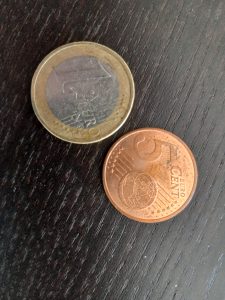
After that, it’s paper currency.
ATM’s in Albufeira
In order to get cash lots of folks may access their accounts via an ATM. I must confess, I’ve never been anywhere in the world where there has been as many ATM’s as we see in Albufeira.
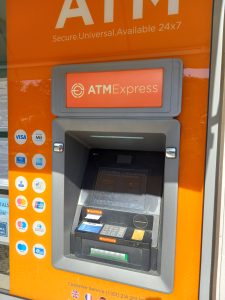
Portuguese drinking water.
We arrived in Lisbon on our first trip to Portugal and paused for a couple of days to get used to the time change from Canada.
In Lisbon the water tastes much like that in almost every other North American city we’ve been in; like a swimming pool, in my opinion. I avoid drinking chlorinated water as completely as I can as I think it’s unhealthy and we needed to address that in Lisbon. We bought bottled water to drink and make coffee.
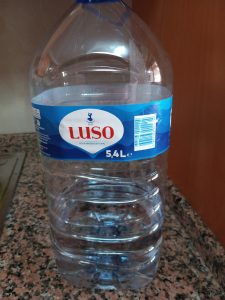
However, in Albufeira I was very pleasantly surprised to find that the water is drinkable right from the tap. There’s a bit of a taste of something, just a hint, and maybe it’s not even chlorine. So far we’ve been drinking the water from the tap and using it to make coffee here in our rental with no issues at all. And that brings me to coffee.
Update: We do know of some folks from Canada that aren’t enjoying the taste of Albufeira water, and one person said they had an upset stomach. Bottled water is available in every mercado if you prefer.
Coffee.
Forget your Black and Decker 12 cup coffee maker folks. This is probably what you are going to find when you get to your rental, assuming appliances are included in yours.
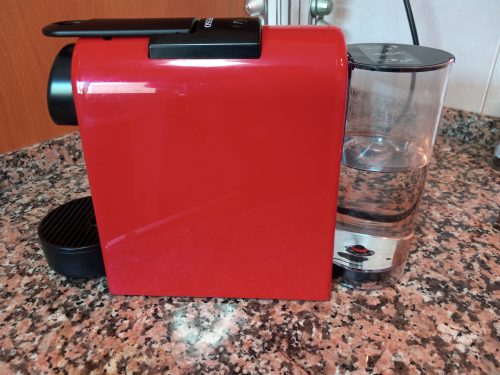
Yes, you can buy ground coffee in the Mercados (markets), but then, if you haven’t a machine, then what?
Is instant coffee available? Yes it is, but no thanks for us, at least. Besides, espresso is growing on us. 🙂
What I do for mine is run the machine, then run it again using the same pod. That extracts the last of the coffee and also thins the original to a more North American consistency. I add a little milk and a dash of sugar as I find the espresso bitter. I don’t use sugar in my Canadian coffee. The result? For me it’s just fine. The boss drinks coffee black, though I run the same pod twice and add a bit of sugar, not milk, for that coffee. (Update: Site visitor Dorota (staying in old town Albufeira) notes that, “We drink our Nespresso black and long, means with extra hot water “. Thanks for that!)
Do you like cream in your coffee? I do. I just haven’t been able to find any. I believe the Portuguese (Portugal) word for cream is krēm but I’ve been having a devil of a time trying to confirm that. In any case, in none of the several Mercados we have visited has there ever been any krēm on the shelf. (Update: Thanks to Dorota, we learned that the correct term for cream in Portugal is Nata (dang you Google!) and stores sell lots. We’ll check it out.)
Here’s what espresso coffee pods look like. Depending on the size of box you can expect to pay about l.5 € for a package of eight at the mercado. The cost per pod drops considerably if purchased in larger boxes. We use four pods a day, so next shopping trip we’ll get the bigger box.
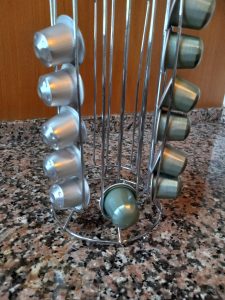
Update: We have friends over from Canada, and their rental comes with a “regular” drip coffee machine, as opposed to the espresso machine we have in our apartment. I guess it’s the luck of the draw as to what kind of coffee maker your rental might have.
Portuguese Milk.
Drink a lot of milk? What’s your preference, whole, semi-skimmed or skimmed? Trying to figure out what milk is which in Portugal is a bit of a challenge.Here’s what we’ve learned.
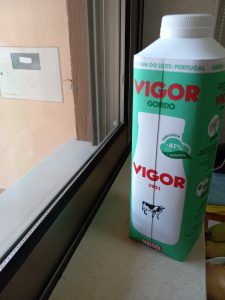
Milk frequently is packaged in one litre containers Sometimes there are two or four of those containers wrapped in a plastic overlay with a handle to make it easier to carry for people buying lots of milk.
There are no milk jugs – plastic or glass – or milk in bags that we could find so far.
Milk is also available in a variety of smaller plastic bottles, many different shapes and styles depending on the source.
The types of milk we’ve found are:
- Leite Gordo (whole milk, usually a green carton)
- Leite Meio-Gordo or Leite Magro (semi-skimmed milk, often a blue carton)
- Leite Desnatado (pink carton – fully skimmed milk)
I have to weasel a bit here. Subsequent to writing this page originally I noticed that some stores have different colour cartons. Different brands may have different names too. Still, Gordo Milk is whole milk. That seems to be for sure.
While milk is sold in the refrigerated sections of stores, it is also to be found, great skids of milk, in some stores aisles. Sterilized milk is ubiquitous, and has a shelf life of several months. We bought a litre today and we’ll see how it tastes in due course.
Cream or “Nata”.
I was of the opinion that stores don’t sell or have a lot of cream. I like cream in my coffee! (Update: FB buddy and now friends here in Albufeira – Dorota & Mel – have advised that the word for cream ins NATA and stores sell lots of it. I’ll keep looking!)
Soy milk & lactose free milk?
In some of the bigger mercados I have seen lots of soy milk, almond milk and I believe I saw lactose free milk as well. (Update: Site visitor Tracey & Thai posted that there is lots of lactose free milk to be had in Albufeira and Portugal. Thank you!)
A break from tidbits for a moment. Here is a photo we took in downtown Albufeira in a plaza overlooking Fishermans Beach.
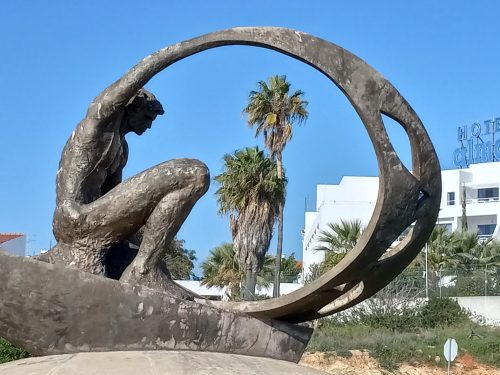
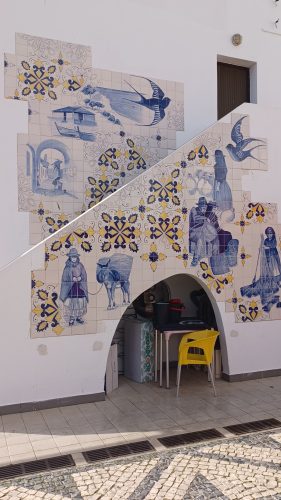
Portuguese Electrical Outlets.
Many folks know that Europe runs on 240 volt AC power, unlike the 120 V AC power that we access via a wall outlet in Canada . The wall outlets in Portugal look odd, from a Canuck’s perspective. Here’s a look at one from a wall here:

These outlets will not accept the Canadian / North American plugs. An adapter is required.
There are many sources for adapters to use in Portugal. I purchased a package of four adapters like the one in the photo following for a total of about $7.00 Cdn. I found on line before we left Canada.
When you search a variety European wall plug adapters will appear. Different countries in Europe may use different style outlets. Of that I can’t be sure since, so far, we’ve only been in Portugal.
Adapters to plug in a 120 VAC, two prong plug into the wall in Portugal look like this one:
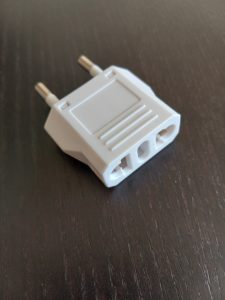
And here you see one with my laptop plug in it, just before I plugged it into a wall socket here. Note that the ground prong on the laptop plug doesn’t insert, but rests on the side of the adapter. Is this an issue? Frankly, I don’t know, I’m not an electrician. I’d rather have the ground prong plugged in, but since there’s no way I can see doing it, I’ve plugged my laptop in as shown, and so far, there had been no problem.
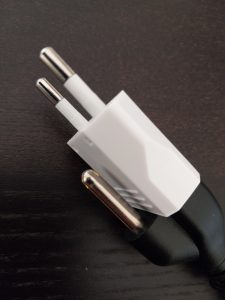
NOTE: In order to use the adapters I’ve shown, the device that you are plugging into the Portuguese wall socket MUST have a power supply rated for 120/240 volts. If you plug in a Canadian device that hasn’t a transformer built in, it will likely fry in short order and may become a hazard. If someone short circuits 240 volts through their body they will be off to the promised land. Be careful!
Wall socket adapters that have a transformer built in are available at big box stores and on line in Canada, and for sure, if you have an account, here in Portugal. In Canada, expect to pay upwards of $60.00.
Fortunately, all of the devices we brought with us; cell phones, laptop, tablet etc. are all rated for 120/240 and can be plugged in Portuguese power with the adapters shown above.
Buses, bus tickets, bus passes in Albufeira.
It’s taken a few days. We’re starting to unravel the intricacies of bus travel in Albufeira. The local buses in Albufeira are GIROs. Their routes allow a visitor to go almost anywhere in Albufeira, and to some locations outside of the town.
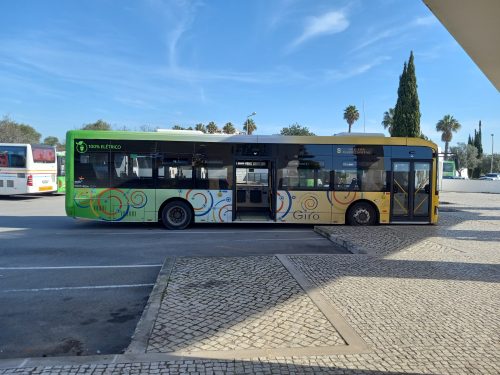
Paying for a ticket on GIRO.
The bus drivers take Euros. Tell the bus driver (Most speak some English, some drivers not very much.) where you wish to go, the driver will advise what the price is, and will take payment in cash.
We took a picture of the GIRO route map. When we climb on, if we aren’t sure where we’re going, we have the map ready to show the driver and point out the stop we’re heading for.
Using cash for fares on GIRO will become expensive if you plan on using the bus regularly. A far better option, revealed to us by our friend Dorota, is to use a bus pass.
There is one zone in “downtown” Albufeira, and if your destination is outside that zone, when you pay your fare, you will be charged more. If you are in town for any length of time and using the local Giro buses appeals, get a bus pass for substantial saving.
GIRO bus pass.
If you are of senior age, you can purchase a month-long bus pass for about 11 Euros plus a one time charge of 5 Euros for the card. It’s good for as many trips as you wish in the month.
On the first day of a new month trundle back to the main bus terminal in Albufeira (all buses get there eventually) and buy a pass for that new month. The monthly fee applies but the card fee shouldn’t as long as you have the old card with you.
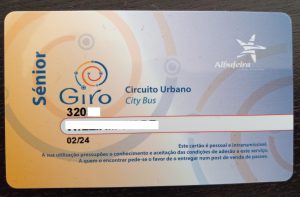
Even if you are only here for two weeks, if you want reasonably easy travel around Albufeira, get the pass. It’s good value. Our first two trips on GIRO without the pass cost us 12 Euro. That got old real quick.
Tip: You WILL need to show your passport when you buy your senior’s bus pass at the terminal. Make sure you have it with you.
GIRO stops are numbered.
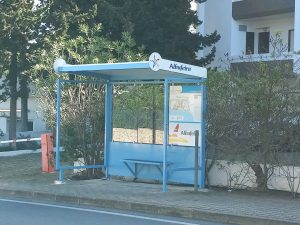
On the wall of the bus shelter you will find a map of all the routes, and information and a timetable for the GIRO stop you are at. The timetable will tell you when the next bus will be along – they are, so far, fairly prompt – and also when the buses on that route start running and that time that the last bus will visit that stop after which you’ll need alternate transport.
Every stop for the GIRO bus in Albufeira has a stop number and the line number that services that stop. Check the route sign in each stop. Not all of GIRO’s lines stop at all bus stops Some bus stops in Albufeira are not for GIRO buses at all.
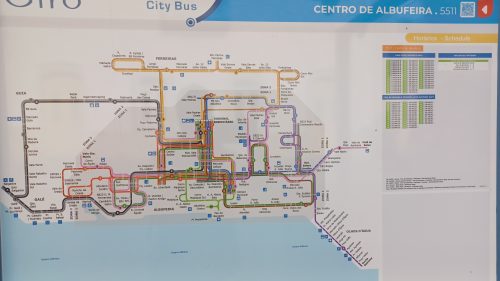
You may recall from another page we had an unexpected change in lodging. Our current rental is east of old town Albufeira, nearer to Olhos de Água. That change turned out to be both a positive and a negative. The positive is the night time where we are is very quiet for sleeping. The negative is that the last bus coming back to where we now stay leaves the Albufeira bus terminal at 7 PM during the week. It’s either early home for us, or finding alternate transport. Mind you, an Uber ride from Old Town to our door is only 6 Euro.
All of the buses used on the GIRO line are “100% Electrico”. That’s what the sign on each bus displays. It’s a pleasure to use public transit in an all-electric fleet.
For more information on GIRO visit here: vamusalgarve.pt
Alternate Transport – Uber, Bolt & Taxi
We had to stock up on a few things from the store when we first arrived in Albufeira. Tickled pink to be out and about on a quite warm January day, we walked quite a distance to the nearest Super mercado.
When leaving the store we realized that humping all that stuff back was beyond us. We opted for taking an Uber, a seamless method of travel in much of Portugal using their no-charge app.
Note: The phone used will have to have a functioning data plan for it to be used to hail an Uber ride.
Hearing that Bolt was more competitively priced, we tried using them on our next trip to the grocery store; not seamless, driver never showed up, so we cancelled the call and went back to using Uber.
There are taxis everywhere in greater Albufeira. There are taxi stands where you contact to that company via their app, to get a taxi, much like Uber and Bolt does. We have not used a taxi yet so cannot comment on the service.
Tip: We designated one of our phones to be used locally, purchased a local SIM with Portugal phone number, and downloaded the Uber app on that phone, using the Portuguese phone number. We tied that Uber account into our WISE card. Anytime we use a drive service we pay in Euros from our Wise debit card and account.
Eggs for breakfast?
Don’t look for eggs in the refrigerated dairy section. Odds are good you’ll find eggs on the shelf in the non-refrigerated section of the store instead. In Portugal eggs do not typically appear to be refrigerated. Of course, being Canuck, as soon as we got them home we put them in the fridge!
Why aren’t they refrigerated at the store? It’s all to do with how eggs are processed. Eggs are not high-temperature cleansed here, if I understand it correctly. That leaves the “protective” layer on the surface of the shell intact, ergo, bacteria cannot get in and the eggs don’t have to be refrigerated.
So far, the eggs we’ve purchased have a darker orange yolk rather than the more yellow yolks we typically see in Canada. They’re sure good, regardless!

On a lighter note…
Evidently it’s against the rules to play the trumpet in some parts of Albufeira! 🙂
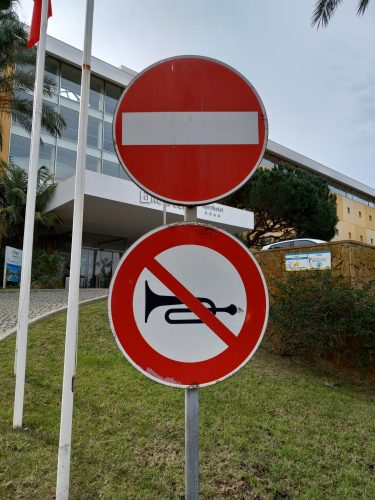
Tidbits about Albufeira – and our Lisbon travels too – continue on this next page. I hope you get the chance to visit.
Thank you too to the folks that left a question in the comment section, I hope those that asked have been answered to their satisfaction.
Cheers.
I am also from the Quinte area. I am following your blog. What do you think it will cost you monthly to live there? I’m looking for a ball-park figure. My husband and I went to Portugal last October and loved it. Thanks.
Hi Darlene. You’ve been here so you know what it costs to get here and I expect have a pretty good idea of what it costs for restaurants etc. So, it’s the cost of lodging that you are inquiring about, I guess. Tough one to answer as everyone has their own idea of what constitutes a “nice place”. You can… Read more »
Thank you for all your time and effort , enjoyed the read and great tips. We’re off to Porto for 4 days, 14 days in Albuferia them 5 days in Lisbon. We leave from TO on the 17th, getting excited!
Cheers Maureen
Thanks for your kind words. Enjoy!
Welcome to Albufeira, we’re from Toronto and this is our 3rd year snow bird here.
Thanks much. Our first time, and loving it!
Have you seen any soy, coconut or lactose free milk in either restaurant/coffee shop or in grocery
Yes, lots.
There are lots of soybean milk and almond milk in the supermarket
Thank you!
Yes indeed. No shortage of soy milk for sure, and I think I saw some lactose free milk at various grocery stores.